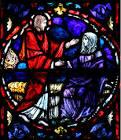
Theodicy, the question of why a good God permits suffering, is one of the themes explored today. In ancient Israel it was thought that the just were rewarded with prosperity and long life and the wicked were punished. The Book of Job is part of Wisdom literature, which is a theology of creation and its meaning, reflected on in different literary forms. It was a genre not confined to the people of Israel but found elsewhere in the Middle East. The Book of Job was probably written between the seventh and fourth centuries BC. It is a mixture of narrative and poetic dialogue. Today’s reading is taken from the interchanges between Job and his ”friends” who assume that, since he has been afflicted with many disasters, he must be guilty of sin. Job knows he is innocent and wonders why he has been treated so badly. God, speaking out of a whirlwind, points out to him that he does not have the divine overview.
Jesus did not view suffering as good in itself, though he willingly accepted his Passion and Cross. His ministry was spent in curing the sick and disabled, casting out devils and even raising the dead to life. However he saw beyond just mere healing, wanting the very best for people by giving them new vision in their lives. When Simon’s mother-in-law recovered after he had helped her to her feet, she began to wait on him and His disciples. Nowadays we might feel that someone who had been stricken with a fever, might have been told to stay in bed, while being brought tea and toast. However the evangelist seems to be conveying the idea that the woman who had received such service from the Lord would in her turn serve his community. The goodness of God still challenges us today.